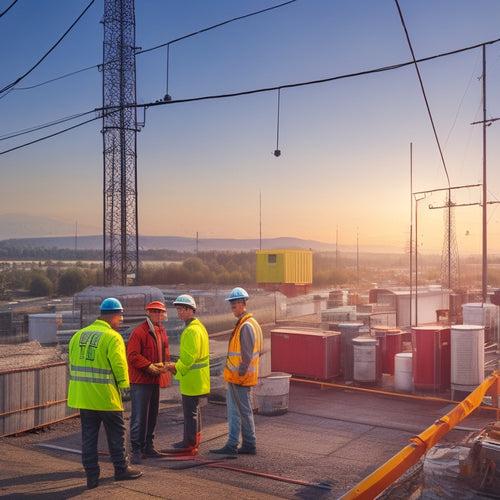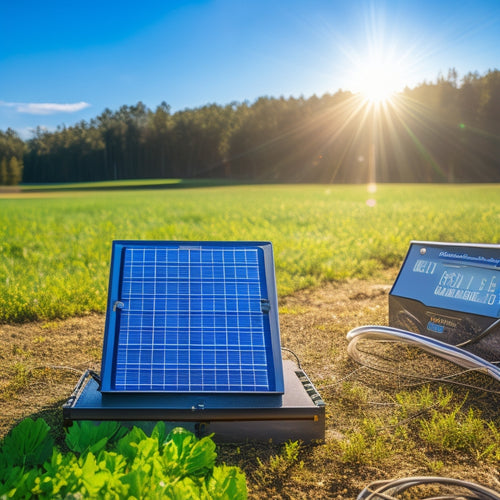
Mastering Your Solar Camping Stove in 7 Essential Tips
Share
Becoming proficient with your solar camping stove can enhance your outdoor cooking while adopting sustainability. Start by positioning your solar panel to maximize sunlight, ideally facing south. Take advantage of peak sunlight hours for better efficiency. Choose the right cooking surface material based on your needs—aluminum heats quickly, while cast iron retains heat. Consider your cooking habits and group size to select the right stove for your meals. Finally, accept simple recipes that require less energy for quicker results. By refining these techniques, you'll enjoy guilt-free cooking and minimize your energy costs. Uncover more essential tips for a seamless solar cooking experience.
At a Glance
- Select the right solar panel type and optimize placement to maximize sunlight capture for efficient cooking performance.
- Choose appropriate cooking surface materials based on heat distribution, durability, and ease of cleaning for effective meal preparation.
- Assess your cooking frequency and group size to determine the suitable stove model that meets your outdoor cooking needs.
- Utilize peak sunlight hours for optimal cooking results, ideally between 10 AM and 3 PM, to enhance energy efficiency.
- Explore eco-friendly fuel options like solar energy or biofuels to promote sustainability and reduce your carbon footprint while cooking outdoors.
Eco-Friendly Energy Source
Using a solar camping stove means utilizing a sustainable energy source that benefits both you and the environment.
By relying on the sun's energy, you greatly reduce your carbon footprint while enjoying your outdoor cooking. This aligns perfectly with the principles of energy independence and off-grid solutions, allowing you to enjoy your excursions without relying on fuel-powered alternatives.
It's a practical choice that supports eco-friendly practices without sacrificing convenience.
Sustainable Energy Benefits
Utilizing the power of the sun, solar camping stoves offer an eco-friendly energy source that greatly reduces your carbon footprint. By utilizing solar energy innovations, you can cook your meals without relying on fossil fuels or generating harmful emissions. This not only promotes a healthier environment but also allows you to enjoy the great outdoors without the guilt of traditional energy sources.
When you use a solar camping stove, you're actively contributing to the reduction of pollution and the preservation of natural resources. The environmental impact of solar cooking is significant, as it cuts down on waste and conserves energy.
Plus, you'll find that these stoves are incredibly efficient, using the sun's rays to heat food quickly and effectively. Embracing solar camping stoves means you're taking a step towards a sustainable lifestyle.
You can wander through nature freely, knowing that your energy choices align with your values of environmental responsibility. So, gear up, and let the sun power your next journey while minimizing your impact on the planet. Your freedom to roam doesn't have to come at the expense of Mother Earth.
Reduced Carbon Footprint
A solar camping stove can greatly reduce your carbon footprint, making it an eco-friendly energy source for outdoor cooking. By utilizing sunlight, you're using a renewable resource that doesn't emit harmful gases. This means you'll enjoy your meals without contributing to air pollution or depleting fossil fuels.
With every meal you prepare on a solar stove, you're actively reducing emissions. Traditional camping methods often rely on propane or charcoal, which can have a significant environmental impact. By switching to solar, you're taking a stand for a cleaner planet while enjoying the freedom of cooking wherever you go.
To maximize your stove's benefits, position it in direct sunlight and keep it clean. This guarantees efficiency and gets your food cooked quickly. Plus, you'll save on fuel costs, allowing you to spend more on excursions instead of supplies.
Embrace the freedom of outdoor cooking with a conscience. Not only will you be feeding your hunger, but you'll also be nurturing the Earth. It's a simple yet powerful step towards sustainability, proving that you can enjoy nature without harming it.
Cost-effective Cooking Solution
Using a solar camping stove is an affordable way to cook while enjoying the outdoors.
You'll not only save on fuel costs, but you'll also benefit from long-term savings as you reduce reliance on traditional energy sources.
Additionally, solar cookers provide a clean and efficient cooking method that can greatly lower your carbon footprint solar energy efficiency.
Plus, utilizing the sun's power means you can cook without adding to your expenses.
Affordable Energy Source
Solar camping stoves offer an eco-friendly and budget-friendly way to cook meals while enjoying the great outdoors. They utilize the power of the sun, providing a sustainable energy alternative to traditional cooking methods. By opting for a solar stove, you can notably reduce your fuel costs and eliminate the need for propane or charcoal.
When you're considering budget options, solar camping stoves often come with a lower initial investment compared to other outdoor cooking appliances. Many models are lightweight and portable, making them perfect for camping trips, tailgating, or picnics.
Plus, they require minimal maintenance, which means more time enjoying your journey without worrying about fuel supplies.
Using a solar stove means you're not only saving money but also embracing a lifestyle that values freedom and sustainability. You can cook meals wherever you are, as long as there's sunlight.
This allows you to venture into remote places without the hassle of carrying bulky fuel supplies. With solar cooking, you'll enjoy the dual benefits of an affordable energy source and a delicious meal under the sun, truly embodying the spirit of outdoor living.
Long-term Savings Benefits
Investing in a solar camping stove can lead to significant long-term savings on cooking expenses. By utilizing the sun's energy, you eliminate the need for fuel, which not only cuts costs but also enhances your freedom while camping. With proper budget planning, you can see excellent investment returns over time.
Here's a simple breakdown of potential savings:
| Expense Type | Traditional Stove Cost | Solar Camping Stove Cost |
|---|---|---|
| Fuel (per trip) | $20 | $0 |
| Maintenance (yearly) | $50 | $10 |
| Average Lifespan | 5 years | 20 years |
Over five years, your total costs can differ dramatically. For a traditional stove, you're looking at $100 in fuel, plus maintenance, whereas your solar stove remains minimal in expenses.
This cost-effective cooking solution not only keeps your wallet happy but also aligns with sustainable living. So, as you gear up for excursions, remember that your choice of stove can impact your finances. Welcome the freedom of solar cooking and watch those savings grow!
Key Components Overview
To get the most out of your solar camping stove, understanding its key components is essential.
You'll want to focus on solar panel efficiency, as it directly impacts your cooking capabilities. Choosing high-capacity solar panels can enhance energy capture, ensuring adequate power for your stove.
Additionally, the type of cooking surface you choose can affect how evenly and quickly your meals are prepared.
For ideal performance, consider how the selection of battery types can influence energy storage and delivery to your camping stove.
Solar Panel Efficiency
When it comes to utilizing the sun's energy for your camping stove, understanding solar panel efficiency is crucial. The efficiency of your solar panels determines how effectively they'll convert sunlight into usable energy. With various solar panel types available today, including monocrystalline, polycrystalline, and thin-film, it's important to know which one suits your needs best.
Recent solar technology advancements have improved efficiency rates, allowing you to capture more energy even in less-than-ideal conditions. Here's a quick overview of factors influencing solar panel efficiency:
| Factor | Impact on Efficiency | Recommended Panel Type |
|---|---|---|
| Sunlight Intensity | Higher intensity enhances output | Monocrystalline |
| Temperature | High temps can reduce efficiency | Polycrystalline |
| Angle of Installation | Correct angle maximizes exposure | Thin-film |
| Shading | Even partial shading is detrimental | Monocrystalline |
Cooking Surface Types
Cooking surface types are essential components of your solar camping stove, directly influencing your cooking efficiency and experience. Choosing the right cooking surface materials can make a significant difference in how well your stove performs. Common materials include aluminum, stainless steel, and cast iron.
Aluminum heats quickly but may not retain heat as effectively, while stainless steel offers durability and decent heat distribution. Cast iron, though heavy, excels in heat retention techniques, making it ideal for slow cooking.
When you're out in the wild, you want a cooking surface that absorbs sunlight and converts it into heat efficiently. Look for surfaces that maximize exposure to the sun and minimize heat loss. Flat surfaces tend to work best, but consider options with slight curvature to enhance heat retention.
Experiment with different materials to find what suits your cooking style. If you're whipping up a quick meal, aluminum might work, but for a leisurely stew, cast iron could be your best bet.
Selecting Based on Cooking Style
When selecting a solar camping stove, first assess how often you plan to cook. Your cooking frequency will help determine the right fuel type that suits your needs.
Whether you're whipping up quick meals or preparing elaborate dishes, the right choice can enhance your outdoor cooking experience.
Additionally, consider how energy storage solutions can complement your cooking activities, especially if you're using renewable energy sources for power, as they can guarantee a reliable supply of energy even when sunshine is limited.
This approach aligns with energy management strategies that maximize efficiency in outdoor settings.
Assess Cooking Frequency
Understanding how often you plan to cook while camping is vital for selecting the right solar stove. Your cooking habits will directly influence your decision. If you enjoy whipping up elaborate meals, you'll need a stove that can handle multiple dishes simultaneously. In contrast, if you prefer quick, simple meals, a smaller, more compact model might suit you just fine.
Meal planning is essential. Think about the types of meals you want to prepare and how frequently you'll be cooking. If you're planning to eat out or have cold meals often, your solar stove needs will be minimal. However, if you envision cooking several times a day, opt for a larger solar stove with a higher output.
Consider the group size as well. Cooking for a family or a group of friends may require a stove that can accommodate multiple servings efficiently.
Evaluating your cooking frequency guarantees you choose a solar stove that meets your needs, giving you the freedom to enjoy your outdoor experience without being tied down by inadequate cooking gear. With the right selection, you'll savor the joy of cooking under the sun.
Choose Fuel Type
Selecting the right fuel type for your solar camping stove can greatly affect your cooking style and experience. You'll want to reflect on your preferences and the meals you plan to prepare. The main fuel types for solar stoves include wood, propane, and biofuels, each offering unique benefits.
If you enjoy quick, straightforward meals, propane might be your best bet due to its high fuel efficiency and easy portability. It heats up rapidly, letting you cook on the go without much hassle.
On the other hand, if you're keen on a more rustic experience, wood can be a fun choice. Just keep in mind that it requires more effort to gather and manage, which mightn't suit everyone.
For those who prioritize sustainability, biofuels are an excellent option. They burn clean and can be made from everyday waste, aligning with eco-friendly camping practices.
Whichever fuel type you choose, make sure it matches your cooking lifestyle. This way, you can enhance your outdoor experience while enjoying delicious meals in the great outdoors.
Sustainable Fuel Source Option
When you choose a solar camping stove, you're tapping into a sustainable fuel source that utilizes the sun's energy.
This not only reduces your carbon footprint but also makes cooking efficient and eco-friendly.
Understanding solar energy efficiency will help you maximize your cooking experience while minimizing environmental impact.
Solar Energy Efficiency
Utilizing the power of the sun, solar camping stoves offer an efficient and sustainable fuel source for outdoor cooking. To maximize their effectiveness, you need to pay attention to solar panel placement. Position your stove to capture direct sunlight, ideally facing south, to enhance energy conversion. The more sunlight your panels absorb, the more power you'll generate for cooking.
Keep in mind that efficiency varies based on weather conditions and the time of day. Cooking during peak sunlight hours—typically between 10 AM and 3 PM—will yield the best results. If you're camping in a shaded area, consider relocating your stove to a sunnier spot for better performance.
Additionally, using reflective surfaces can help direct more sunlight onto your panels. This simple trick can greatly increase energy conversion rates.
When it comes to cooking, choose simple meals that require less time and energy, allowing you to make the most of your solar setup.
Frequently Asked Questions
How Do I Clean My Solar Camping Stove Effectively?
To clean your solar camping stove effectively, use gentle cleaning techniques like warm soapy water and a soft cloth. Regular maintenance tips, such as checking for debris and ensuring all components are dry, keep it functioning at its best.
Can I Use a Solar Stove in Cloudy Weather?
Even under a blanket of clouds, your solar stove can still catch rays like a net catching fish. While solar energy efficiency drops in cloudy conditions, you can still cook—just be patient and adjust expectations.
What Safety Precautions Should I Take When Using a Solar Stove?
When using a solar stove, make certain you're aware of the materials involved, avoiding flammable items nearby. Welcome solar cooking benefits, like energy efficiency, while always monitoring your stove to prevent accidents or overheating. Stay safe!
How Long Does It Take to Cook Food Using Solar Energy?
Solar cooking times vary based on sunlight intensity and the dish you're preparing. Generally, expect longer cooking times than conventional methods, but with solar energy efficiency, you'll enjoy a sustainable cooking experience without the hassle of fuel.
Are There Any Specific Recipes for Solar Cooking?
Imagine the sun as your kitchen helper. With solar cooking techniques, you can whip up your favorite solar recipes like vegetable stew or baked potatoes. Enjoy the freedom of cooking with nature's energy!
Explore More
By mastering your solar camping stove with these seven essential tips, you're not just cooking—you're utilizing the power of the sun like a culinary superhero! Imagine whipping up gourmet meals while saving the planet, all without a single drop of fuel. With eco-friendly energy at your fingertips, you're not just camping; you're leading a revolution in outdoor cooking. So, grab that stove, channel your inner solar chef, and let the sun fuel your next journey!
Related Posts
-

Why Outdoor Solar Lighting Systems Are Sustainable
Outdoor solar lighting systems are sustainable because they utilize renewable energy, drastically reducing your carbo...
-

Smart Grid Technology Implementation Challenges
You'll encounter several challenges when implementing smart grid technology, particularly in cost management, scalabi...
-

Choosing the Right Solar Power Charge Controller
Choosing the right solar power charge controller is crucial for maximizing energy efficiency and extending battery li...


